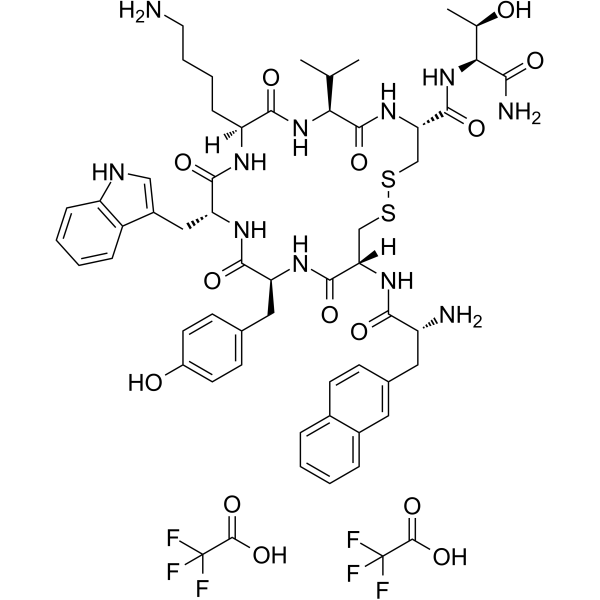Lanreotide diTFA
Modify Date: 2023-05-16 11:29:39

Lanreotide diTFA structure
|
Common Name | Lanreotide diTFA | ||
|---|---|---|---|---|
| CAS Number | 1024499-83-9 | Molecular Weight | 1324.37 | |
| Density | N/A | Boiling Point | N/A | |
| Molecular Formula | C58H71F6N11O14S2 | Melting Point | N/A | |
| MSDS | N/A | Flash Point | N/A | |
Use of Lanreotide diTFALanreotide (BIM 23014) diTFA is a somatostatin analogue with antineoplastic activity. Lanreotide diTFA can be used for the research of carcinoid syndrome[1][2]. |
| Name | Lanreotide diTFA |
|---|
| Description | Lanreotide (BIM 23014) diTFA is a somatostatin analogue with antineoplastic activity. Lanreotide diTFA can be used for the research of carcinoid syndrome[1][2]. |
|---|---|
| Related Catalog | |
| In Vitro | Lanreotide (BIM 23014) (100 nM; 0-48 h) enhanced radiation-induced apoptosis[1]. Lanreotide results in a dose-dependent decrease in GH3 cell colony forming units. Lanreotide at concentrations of 1, 10, 100, and 1000 nM results in cell survival rates of 75, 56, 39 and 27% respectively. The IC50 is 57 nM[1]. Lanreotide inhibits GH-secreting pituitary adenoma cell proliferation and hormone release in vitro[2]. Apoptosis Analysis[1] Cell Line: GH3 Concentration: 100 nM Incubation Time: 48 h, 24 h, or immediately (0 h) before radiation Result: Increased apoptotic sub-G1 proportion compared with radiation alone. |
| In Vivo | Lanreotide (2.5-10mg/kg; s.c.; daily for 5 days) results in tumor growth inhibition[1]. Animal Model: Male nude mice, 8 weeks old and 20–25 g in body weight (GH3 tumor-bearing nude mice)[1] Dosage: 2.5, 5, 10 mg/kg Administration: Subcutaneous; daily for 5 days Result: Produced tumor growth inhibition. |
| References |
| Molecular Formula | C58H71F6N11O14S2 |
|---|---|
| Molecular Weight | 1324.37 |